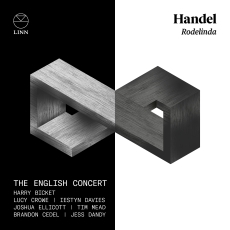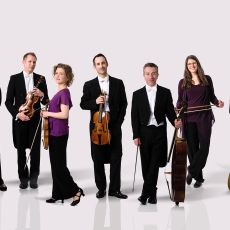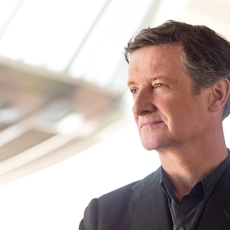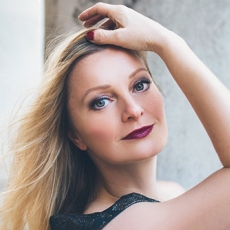The English Concert - Handel: Rodelinda - Planet Hugill
4.5*
Handel's 1725 opera Rodelinda is not only one of his acknowledged masterpieces but also an opera where Handel's approach to the opera seria form created an opera that resonates with contemporary audiences in a way that many others do not. The opera was based on pre-existing sources and, as with his other operas written for London audiences, Handel and his librettist, Nicola Haym, heavily trimmed the source material; Londoners were not keen on vast quantities of explanatory recitative (which usually meant following the translation in the printed libretto) and some of Handel's later operas get positively telegraphic. With Rodelinda, Handel and Haym seem to have made this compression serve the plot, as well as tieing the arias more directly to the action. Unusually for an opera seria, Rodelinda almost unfolds as a linear narrative in a way which modern audiences identify with, and some distance away from the rather knotty plotting of some opera serias which rather resemble a complex historical novel than the more direct narrative arc of many later operas.
As a result, Rodelinda has done rather well in performance and on disc. For some years, Harry Bicket and The English Concert have been doing an annual Handel opera tour in collaboration with the Carnegie Hall with casts which mix operatic luminaries from both sides of the Atlantic [see my 2019 interview with Harry Bicket]. 2020 was to be no different, but inevitably the planned tour was cancelled. However, the orchestra decided to go ahead and recorded Rodelinda in September 2020 at St John's Smith Square with socially distanced performers. Inevitably, giving restrictions on travel, the cast is somewhat less international than previous recordings but is a very strong one. Handel's Rodelinda is on LINN Records; Lucy Crowe is Rodelinda with Iestyn Davies as Bertarido, plus Joshua Ellicott as Grimoaldo, Brandon Cedel as Garibaldo, Jess Dandy as Eduige and Tim Mead as Unolfo, with Harry Bicket directing The English Concert from the harpsichord.
As a recording project we get a remarkably complete view of Rodelinda, even Unolfo gets all three of his arias. The result has a luxury of length (three acts of 68 minutes, 66 minutes and 65minutes) which, whilst not approaching Giulio Cesare, is certainly more suitable to home listening than the modern opera house. Handel and Haym's changes mean that the title role is most definitely the prominent one, but a point worth making is that after Rodelinda, Bertarido and Grimoaldo have the same number of arias (though Bertarido also has a duet with his wife and an accompanied recitative). Grimoaldo is an unusually prominent tenor role, written for Francesco Borosini who had created the role of Bajazet in Handel's Tamerlano the previous year. It is a similarly complex role and makes the opera unusually intriguing to modern audiences.
Lucy Crowe stakes her claim on the role of Rodelinda from the first moments of her opening scene. Crowe is wonderfully plangent, and throughout the opera, she manages to make Rodelinda's nobility and firmness of purpose expressively interesting. Crowe is fast, fluent and emotive in the passagework, but it is in the slower passages that she really brings out the character. That said, her Act Two aria 'Spietato' is thrillingly spat out, and throughout Crowe makes us understand Rodelinda's firmness and underlying strength. This is reflected in her performance which prizes the expressive strength of line, whilst giving us moments of great beauty. I often think that you can get an impression for how the tessitura of a role sits in a singers voice by tracking what they do in the Da Capo repeats. Here, Crowe's instinct is to go upwards; it is not that her ornaments are too elaborate but that she has a tendency to push the envelope of an aria by adding extra high notes.
Iestyn Davies is another singer whose singing can be extremely beautiful with his fine-grained tone, and in arias such as Bertarido's 'Dove Sei' he creates magical moments, but Davies also manages the trick of making Bertarido interesting. This is a character who can sometimes seems frustratingly passive, even rather wet, but Davies brings a sense of engagement that helps make Bertarido interesting, culminating in the thrilling final aria 'Vivi, tiranno'. Just occasionally, however, I wish that Davies allowed Bertarido to be a bit frayed at the edges and less poised. Bertarido is good, however and 18th-century audiences wanted to see noble heroes put into morally challenging situations (hence the tendency to knotty plotting). What Davies does is make this goodness and moral fibre seem interesting.
Against Rodelinda and Bertarido's strength of purpose must be set Grimoaldo's sheer vacillation. That is what makes his character interesting, he is tempted by Garibaldo's plans and suggestions but is also weak-willed. He changes mood constantly and is ultimately rather soft-hearted yet with the viciousness which can come with a weak will. Joshua Ellicott brings this out in spades with a rather nice whiny edge to his recitative, and a brilliant sense of character in the arias. Granted, Ellicott's passagework is not always pin-precise, but then if it was would we really believe in Grimoaldo's character. What Ellicott does is take Handel and Haym's Grimoaldo seriously, culminating in the terrific accompagnato which leads up to the aria where he effectively gives up and imagines himself a shepherd!
Eduige is one of the characters who suffer as a result of Handel and Haym's compressions, so that though she develops she does so in a sketchy form. However, the role was written for real contralto voice and here suits Jessica Dandy to a tee. She brings out the character of each of her arias and makes the most of the frustrating little that the composer gives her, especially as the third aria is remarkably perky. Garibaldo only gets two arias, which seems too few for such a pivotal character. Both the arias are lively bass-villain territory, which Brandon Cedel sings finely indeed, though at times I wondered whether he could have been nastier.
Unulfo is a puzzling character. He is virtually the only good person in the cast, and the one who acts morally and rationally (both Rodelinda and Bertarido have moments which though moral, seem rather irrational or simply stubborn). He is important in the plot, but his arias can sometimes feel superfluous. Certainly, Handel gives him three terrific arias and Tim Mead takes advantage of the opportunity to give us some superbly virtuoso and expressive Handel singing. Mead's approach to Unulfo brings out another strength of this cast, no-one sounds like anyone else and whilst listening there is never that frustrating moment when one singer can sound like another.
The recording was made under social distancing restrictions with performers all spaced out. This is somewhat a challenge for an instrumental ensemble like the English Concert but they rise to the occasion and the performance was so engaging that I did not feel the need to listen with a fine tooth-comb. They use a pretty large ensemble, considering, with 28 wind and strings plus two theorbos and a second harpsichord.
But 2020's restrictions also meant that the cast did not have the advantage of a sequence of live performances and perhaps this shows up in the recitative. It is never less than fluid and fluent but sometimes comes over as a bit too steadily regular. The opera has several scenes which introduce drama to the formalised opera seria layout, such as when in Act Two, Eduige overhears Bertarido (whom she thinks dead), or Bertarido's Act Three prison scene where his musings are interrupted by the appearance of a sword (thrown by Eduige), and Grimoaldo's sleep scene when Garibaldo thinks of killing him. The experience of live performance would perhaps have brought an added sense of vividness and urgency to these moments.
But that is a small point, and this is a fine performance and finely engaging performance of one of Handel's masterpieces. With a trio of principals who bring style, technique and character to their roles and a complete cast of equal calibre, supported by vivid instrumental playing, and you have a performance that is certainly well worth the extra effort that had to go into its making.




